Installing Floodlight Cam Wired Plus and Pro
Safety and compliance information for Floodlight Cam Wired Pro
Safety and compliance information for Floodlight Cam Wired Plus
View/download Floodlight Cam Wired Pro PDF manual (العربية)View/download Floodlight Cam Wired Pro PDF manual (English, Français, Deutsch, Italiano, Español, Nederlands, Svenska, Dansk, Suomi, Norsk)View/download Floodlight Cam Wired Plus PDF manual (العربية)View/download Floodlight Cam Wired Plus PDF manual (English, Français, Deutsch, Italiano, Español, Nederlands, Svenska, Dansk, Suomi, Norsk)Before you begin
WARNING: Electrical shock hazard. Disconnect power to the installation area at your circuit breaker or fuse box before beginning installation. Always use caution when handling electrical wiring.
Installation by a qualified electrician may be required in your area. Refer to your local laws and building codes before performing electrical work; permits plus professional installation may be required by law.
- Turn off power at the fuse box before installing.
- Verify that the supply voltage is correct. Connect fixture to a 100~240 VAC 50/60 Hz power source.
- The earth wire must be connected to the light fixture. DO NOT INSTALL if a working earth connection is not available.
- Do not connect this light fixture to a dimmer switch or timer.
CAUTION: Risk of fire.
Do not install near combustible or flammable surfaces. Floodlight Cam Wired Pro and Plus must be installed on a wall or eave.
Installation steps
To install your Floodlight Cam Wired Pro or Plus device, follow these steps:
- Open the Ring app and select Set Up a Device. Then follow the in-app instructions.
- Scan the QR code found on the front of the manual, or on the back of the camera. This identifies your Ring device to make setup fast and easy.
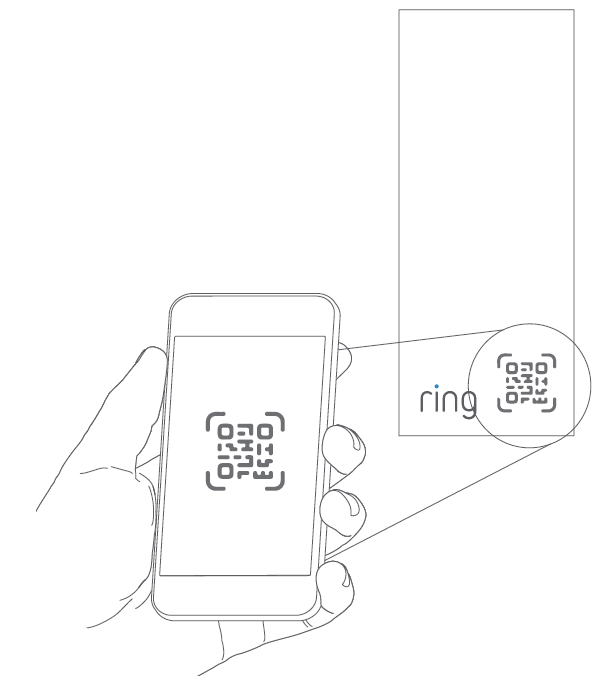
3. Turn off the power at the fuse box
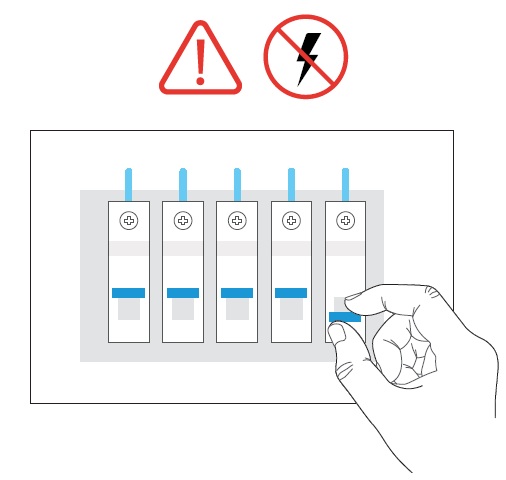
You’ll be working with electrical wires during the install process. If you don’t know where the fuse box is or how to turn off power to the floodlight circuit, we recommend you hire a licensed electrician.
4. Prep your Floodlight Cam Wired Pro or Plus for installation
First, rotate the light out of the way, like this:
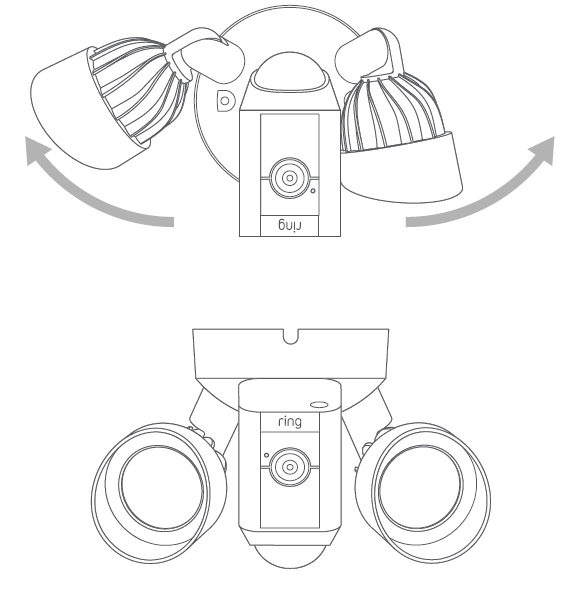
If you’re mounting on an eave or overhang, your camera is already in position.
If you’re mounting to a wall, rotate the camera into position like this:
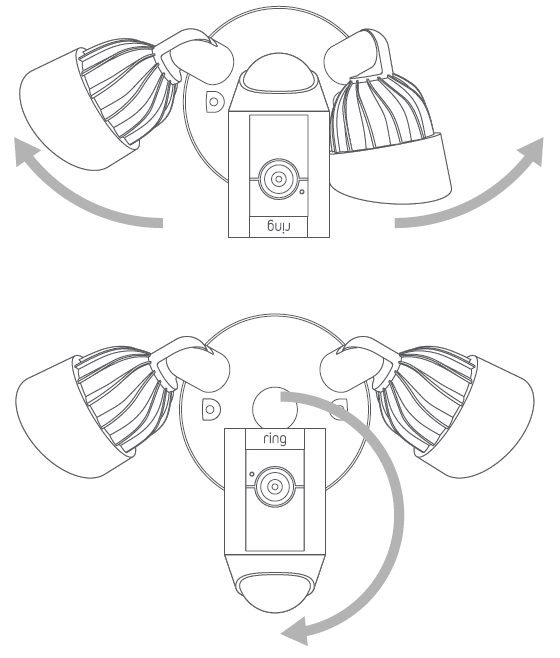
5. Remove your existing floodlight
- With power off at the fuse box, remove the existing floodlight from the wall and disconnect the wires. If there is a bracket attached to the wall, remove that as well.
- Remove the plastic mounting plate from the light fixture.
Push gently on the threaded posts visible on the front of the fixture and pull the bracket free.
6. Install the anchors
If you’re installing on wood, skip this step.
If installing on stucco, brick or concrete, mark 2 drill holes using the plastic mounting plate as a template. Then, use a 6mm masonry drill bit (not included) to drill holes in the wall, and insert the included anchors.
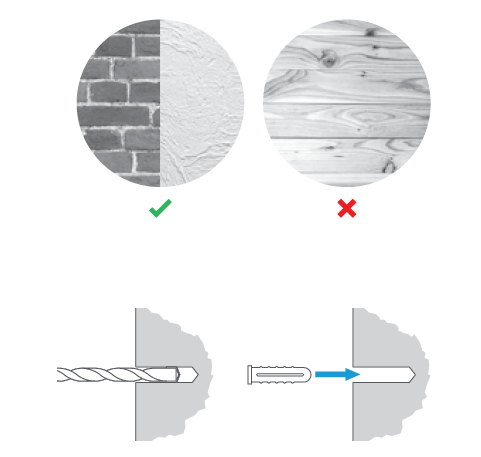
7. Install the mounting plate
Run the wires through the hole in the mounting plate.
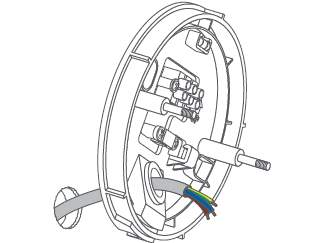
Install the mounting plate with the two posts level with the ground, or level with the wall if mounting on an eave or overhang. Ensure the “UP” arrow is pointing upwards for wall mounting, and away from the area to be monitored for eave and overhang mounting.
Secure the plate with the two mounting screws. Then, push the included rubber plug over the screws to seal.
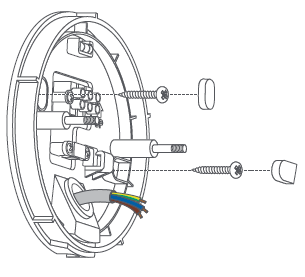
8. Release the pressing plate
Using the Philips head end of the included screwdriver, loosen and remove one of the screws on the pressing plate and rotate it out of the way. Place the power cable into the channel, but don’t replace the pressing plate just yet.

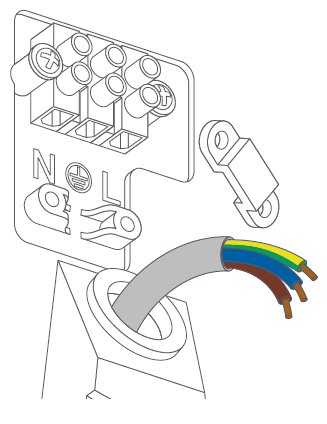
9. Secure the wires to the terminals

With power still turned off at the fuse box, slide the earth wire into the centre bay on the bottom of the terminal block and tighten with the flathead end of the included screwdriver. Then slide the line wire into the bay on the bottom of the terminal block marked “L” and tighten with the flathead end of the screwdriver.
Repeat with the neutral wire, sliding it into the bay marked “N” and tightening with the flathead end of the screwdriver.
Tug each wire individually to make sure they are secure.
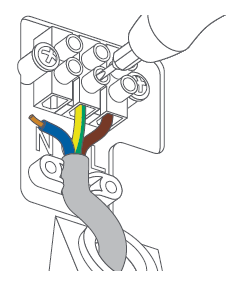
10. Replace the pressing plate
Once you’ve confirmed the wires are secure, replace the pressing plate over the power cable and tighten with the Phillips head end of the screwdriver.
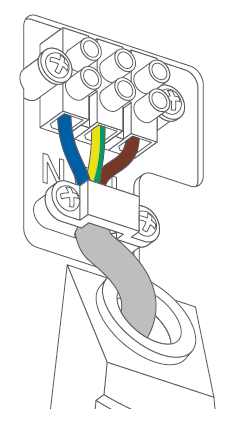
11. Hang it up
Locate the nylon strap on the back of the Floodlight Cam Wired Pro or Plus light fixture, and loop the plastic buckle at the end over the plastic hook on the mounting plate. Make sure the buckle and hook are secure before releasing the light fixture.
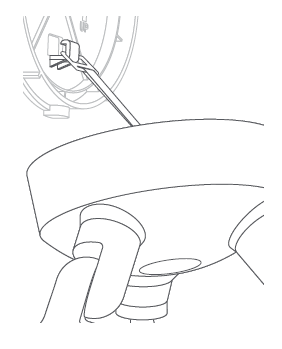
12. Connect the wires from the light fixture
With power still turned off at the fuse box, slide the earth wire into the centre bay on the top of the terminal block and tighten with the flathead end of the included screwdriver.
Then slide the line wire into the bay on the top of the terminal block marked “L” and tighten with the flathead end of the screwdriver.
Repeat with the neutral wire, sliding it into the bay marked “N” and tightening with the flathead end of the screwdriver.
Tug each wire individually to make sure they are secure.
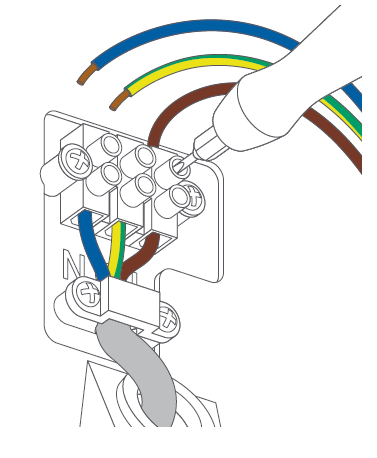
13. Mount the light fixture
Align the two holes on the light fixture with the threaded posts on the plastic mounting plate. Slide the light fixture onto the posts and push it firmly into place.
Secure the fixture using two of the coloured hex cap nuts over the ends of the threaded posts. Remove the reversible bit from the included screwdriver and use the handle to tighten the hex cap nuts.
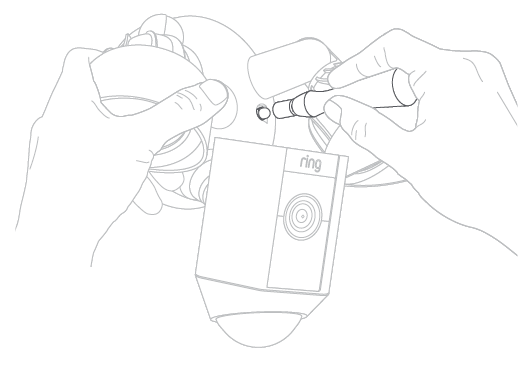
14. Restore power at the fuse box
Now that the Floodlight Cam Wired Pro or Plus is installed, you can turn power back on at the fuse box. The lamps will flash once it’s powered on.
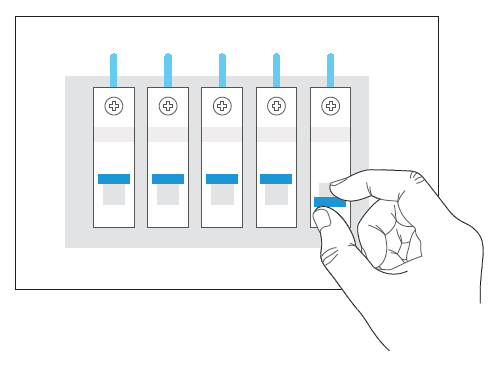
15. Complete setup in the Ring app
Once your Floodlight Cam Wired Pro or Plus powers on, follow the instructions to continue with setup in the app.
